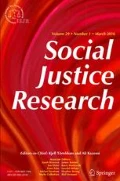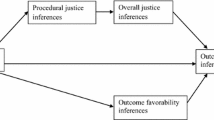Abstract
At Time 1, 171 students were administered questionnaires for measuring sensitivity to befallen injustice (SBI), trait anger, anger in, anger out, anger control, self-assertiveness, and attitudes toward principles of distributive justice (equality of chances, equity). Two months later (Time 2), 75 of these subjects were treated unfairly in a laboratory situation dealing with competition and achievement behavior. Two justice principles were violated: the equality of chances principle and the equity principle. Four weeks later (Time 3), 32 subjects evaluated the unfair treatment in retrospect. All three occasions were presented as independent studies with the subjects perceiving no connection between them. In line with our hypotheses, we found that immediate and delayed reactions to the unjust treatments depended to a considerable degree on SBI. For example, the combined score of the SBI questionnaire predicted, with a beta weight of .71, a combined rating of three experts who used various sources of objective information (e.g., tape-recorded interactions between subject and experimenter) to estimate the degree to which the subject displayed emotional, verbal, and behavioral resentment against the unfair treatment. At the same time, measures for other constructs (e.g., assertiveness, trait anger, anger expression), which can also be linked theoretically to the criteria, explained either none or a much smaller proportion of variance in reactions to unjust treatment.
Similar content being viewed by others
References
Aiken, L. S., and West, S. G. (1991).Multiple Regression: Testing and Interpreting Interactions. Newbury Park, CA: Sage.
Cattell, R. (1966). The scree test for the number of factors.Multivar. Behav. Res. 1: 245–276.
Dar, Y., and Resh, N. (1993).Exploring the multi-dimensional structure of sense of deprivation: The case of Israeli junior high school students. Paper presented at the IVth International Conference on Social Justice in Trier.
Hassebrauck, M. (1993).Development of a scale to measure sensitivity toward inequity. Unpublished manuscript, University of Mannheim, Mannheim, Germany.
Huseman, R. C., Hatfield, J. D., and Miles, E. W. (1985). Test for individual perceptions of job equity: Some preliminary findings.Percept. Motor Skills 61: 1055–1064.
Lovas, L. (1995). Nespravodlivost v interpersonalnych vztahoch [Injustice in interpersonal relations].Ceskoslovenska Psychol. 34: 203–212.
Lovas, L., and Pirhacova, I. (1996). Anxieta, hnevlivost a senzitivita voci nespravodlivosti [Anxiety, anger, and sensitivity to injustice].Ceskoslovenska Psychol. 40: 248–255.
Major, B., and Deaux, K. (1982). Individual differences in justice behavior. In Greenberg, J., and Cohen, R. L. (eds.),Equity and Justice and Social Behavior, Academic Press, New York, pp. 43–76.
Mikula, G. (1993). The experience of injustice. In Stroebe, W. and Hewstone, M. (eds.),European Review of Social Psychology, Vol. 4, Wiley, Chichester, U.K., pp. 223–244.
Mohiyeddini, C. (1995).Sensibilität für widerfahrene Ungerechtigkeit als Disposition: kognitive, emotionale sowie behaviorale Reaktionen auf ungerechte Behandlung. Unpublished diploma thesis, Trier University, Trier, Germany.
Montada, L., Dalbert, C., Reichle, B., and Schmitt, M. (1986). Urteile über Gerechtigkeit, “existentielle Schuld” und Strategien der Schuldabwehr. In Oser, F., Althof, W. and Garz, D. (eds.),Moralische Zugänge zum Menschen—Zugänge zum moralischen Menschen, Kindt, München, Germany, pp. 205–225.
Montada, L., Dalbert, C., and Schneider, A. (1990).Coping mit Problemen sozial schwacher Menschen. Ergebnisse der Längsschnittuntersuchung (Berichte aus der Arbeitsgruppe “Verantwortung, Gerechtigkeit, Moral” No. 53), Trier University, Trier, Germany.
Montada, L., Schmitt, M., and Dalbert, C. (1983).Existentielle Schuld: Rekrutierung der Untersuchungsstichprobe, Erhebungsinstrumente und Untersuchungsplan (Berichte aus der Arbeitsgruppe “Verantwortung, Gerechtigkeit, Moral” Nr. 20), Trier University, Trier, Germany.
Montada, L., Schmitt, M., and Dalbert, C. (1986). Thinking about justice and dealing with one’s own privileges: A study of existential guilt. In Bierhoff, H.-W., Cohen, R. L., and Greenberg, J. (eds.),Justice in Social Relations, Plenum Press, New York, pp. 125–143.
Montada, L., and Schneider, A. (1989). Justice and emotional reactions to the disadvantaged.Soc. Justice Res. 3: 313–344.
Nechvatal, A. (in press).Gerechtigkeitssensibilität aus der Beobachterperspektive. Unpublished diploma thesis, Trier University, Trier, Germany.
Schmitt, M., Behner, R., Müller, L., and Montada, L. (1992).Werte, existentielle Schuld und Hilfsbereitschaft gegenüber Indios und landlosen Bauern in Paraguay (Berichte aus der Arbeitsgruppe “Verantwortung, Gerechtigkeit, Moral” Nr. 68, Trier University, Trier, Germany.
Schmitt, M., and Dörfel, M. (1996).Effects of justice sensitivity and procedural injustice in the workplace on job satisfaction and psychosomatic well-being (Berichte aus der Arbeitsgruppe “Verantwortung, Gerechtigkeit, Moral” Nr. 103). Trier University, Trier, Germany.
Schmitt, M., Maes, J., and Schmal, A. (1995).Gerechtigkeit als innerdeutsches Problem: Einstellungen zu Verteilungsprinzipien, Ungerechtigkeitssensibität und Glaube an eine gerechte Welt als Kovariate (Berichte aus der Arbeitsgruppe “Verantwortung, Gerechtigkeit, Moral” Nr. 82), Trier University, Trier, Germany.
Schmitt, M., Maes, J., and Schmal, A. (in press).Gerechtigkeit als innerdeutsches Problem: Analyse der Messeigenschaften von Messinstrumenten für Einstellungen zu Verteilungsprinzipien, Ungerechtigkeitssensibität und Glaube an eine gerechte Welt (Berichte aus der Arbeitsgruppe “Verantwortung, Gerechtigkeit, Moral” No. 104), Trier University, Trier, Germany.
Schmitt, M., and Mohiyeddini, C. (1996). Sensitivity to befallen injustice and reactions to a real life disadvantage.Soc. Justice Res. 9: 223–238.
Schmitt, M., Neumann, R., and Montada, L. (1992).Sensitivity to experienced injustice: Structural equation measurement and validation models (Berichte aus der Arbeitsgruppe “Verantwortung, Gerechtigkeit, Moral” Nr. 67), Trier University, Trier, Germany.
Schmitt, M., Neumann, R., and Montada, L. (1995). Dispositional sensitivity to befallen injustice.Soc. Justice Res. 8: 385–407.
Schneider, A., Meissner, A., Montada, L., & Reichle, B. (1987).Validierung von Selbsberichten über Fremdratings (Berichte aus der Arbeitsgruppe “Verantwortung, Gerechtigkeit, Moral” Nr. 41), Trier University, Trier, Germany.
Schwenkmezger, P., Hodapp, V. (1989). Das State-Trait Anger Expression Inventory (STAXI): Itemmetrische und faktorenanalytische Befunde und Untersuchungen zur Konstruktvalidität.Trierer Psychol. Berichte 16 (Heft 1).
Spielberger, C. D. (1988).State-Trait Anger Expression Inventory. Research Edition, PAR, Odessa, FL.
Steyer, R., Ferring, D., and Schmitt, M. (1992). States and traits in psychological assessment.Eur. J. Psychol. Assess. 2: 79–98.
Ullrich de Muynck, R., and Ullrich, R. (1976).Assertiveness-Training-Programm ATP, Pfeiffer, München, Germany.




